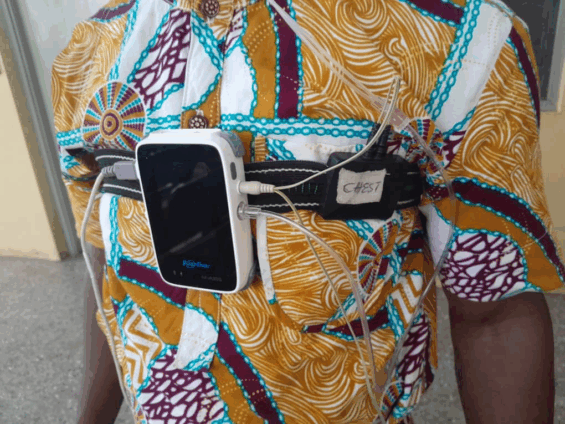There was delight in 33-year-old Korkor’s voice as she recounted her victory after struggling with sleep problems last year.
“When I woke up one morning, I had lost my ability to speak and had no idea what was happening to me,” she recalled.
Korkor, not her real name, was rushed to the hospital by her sister. She regained consciousness with oxygen tubes fitted into her nostrils.
“I was initially diagnosed with a brain injury. I lost my ability to speak and was receiving oxygen to my brain,” she said.
She never thought her condition was linked to obstructive sleep apnea until Consultant Pulmonologist and Respiratory Physician Specialist at the Korle Bu Teaching Hospital, Professor Jane Afriyie-Mensah, suggested she undergo a sleep test.
She was later diagnosed with sleep apnea.
Sleep apnea is a medical condition in which an individual experiences abnormal sleep patterns, with breathing repeatedly stopping and restarting during sleep.
“During sleep, we all breathe normally. But there are some people whose breathing patterns become very erratic. In fact, it becomes obvious to those who share a bed or room with them,” Prof. Afriyie-Mensah explained.
Globally, it is estimated that about one billion people live with obstructive sleep apnea. According to studies by Malhotra et al., around 90 million people in Europe are grappling with moderate to severe sleep apnea.
In Ghana, knowledge of sleep apnea is low due to limited awareness among health practitioners and a lack of diagnostic tools to assist patients. This challenge is not unique to Ghana but is common across many developing countries in Africa.
A study conducted by Afriyie-Mensah et al. (2024), titled Profile of Patients with Obstructive Sleep Apnea, reviewed home sleep study reports from Korle Bu Teaching Hospital between 2020 and 2022.
The study found that 76% of the 144 patients captured in the sleep study records had either moderate or severe obstructive sleep apnea.
“This means that in a week, out of four to five sleep tests conducted, three of the patients show patterns suggestive of sleep apnea,” Prof. Afriyie-Mensah explained.
While living with the condition is uncomfortable, the biggest challenge is the cost of treatment. Continuous Positive Airway Pressure (CPAP) machines, which aid breathing during sleep, are extremely expensive.
Korkor spent GH¢17,000 (about $1,500) to acquire her machine. For the general public, however, the options are either to rely on the very few available at public facilities or pay exorbitant fees at private centres.
A JoyNews investigative team tested the system as ghost patients at the Chest Department of the Korle Bu Teaching Hospital. They found that it costs GH¢700 for a session on the sleep machine, while a full sleep study costs GH¢1,400.
Private facilities charge as much as GH¢6,500 to be placed on the sleep machine, said Ernest Amaning-Kwarteng, a chest physician at Korle Bu, whom the team interviewed.
“If the respiratory physician steps out of the office to attach the machine to a patient outside the hospital premises, the patient is required to pay additional fees, which cover transportation costs,” he explained.
According to the 2024 Below the Poverty and Low-Income People’s (BoP) Report published by Deutsche Gesellschaft für Internationale Zusammenarbeit (GIZ), 24% of Ghanaians live below the $2.15 poverty line, 41% below $3.65, and 76% below $6.85.
This means 8.42 million people living under $2.15 a day cannot afford Korkor’s CPAP machine.
Mr. Amaning-Kwarteng explained that Korle Bu has only one sleep machine, which was given to the unit by a private facility. At GH¢700 per session, only a tiny fraction of Ghanaians living below $6.85 a day could afford it.
Prof. Afriyie-Mensah also noted that there are only three centres in Accra capable of conducting sleep tests, which require overnight monitoring.
Even Korle Bu itself has only one machine, she confirmed. This scarcity and the high cost of treatment reflect the deep inequalities in Ghana’s healthcare system.
With a CPAP machine priced at GH¢17,000 and a single session costing GH¢700, millions of Ghanaians living below the poverty line are excluded from treatment.
Back to Korkor. She recalled being uncomfortable using the machine at first.
“I would just wake up and take it off. But I realised that when I kept it on, I slept through the night without interruption. Over time, I began waking up refreshed in the morning,” she said.
She admitted that while the treatment is effective, the price is a major burden. “I bought it for GH¢17,000. Mine is portable, but it is very expensive. That’s the disadvantage,” she explained.
She believes more lives could be saved if awareness about sleep apnea is created.
Prof. Afriyie-Mensah agrees. She noted that symptoms of sleep apnea include excessive snoring, excessive daytime sleepiness, and, in severe cases, patients struggling to sleep properly.
“During sleep, such patients may snore heavily, stop breathing temporarily, and in severe cases, wake up as if experiencing turbulence,” she said.
According to her, the most dangerous cases involve patients falling asleep while driving. “Other motorists have to honk at them, and sometimes accidents occur as a result,” she added.
The pulmonologist warned that sleep apnea can lead to serious complications, including hypertension, diabetes, strokes, and, in rare cases, sudden death during sleep.
She explained that in other countries, screening at-risk patients is standard practice, which allows early detection and treatment.
“Obese patients and those with chronic diseases are at higher risk of developing sleep apnea,” she said, adding that more attention should be given to screening long-distance drivers in Ghana.
She called for a national policy to raise awareness about obstructive sleep apnea and screen individuals at risk.
Source: Kwetey Nartey
ALSO READ:



